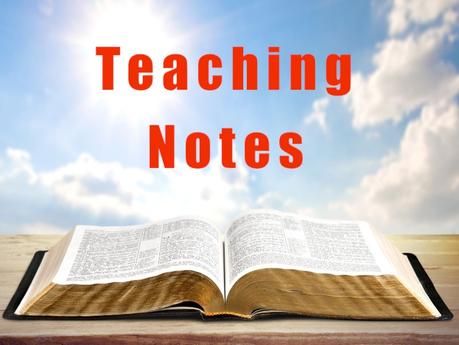Grace Thoughts
Teaching Notes: On Genesis 4

Teaching Notes are Bible studies we taught before GraceLife Ministries began publishing articles online in 1995. Some were presented as sermons, others as group studies.
Our hope is that these older studies will be a blessing to you in your life and ministry. Please use them in any way God leads you.
These teaching notes are from a series of studies about the Book of Genesis.
[These notes are from a study from almost 45 years ago.]
Genesis 4:1-2a
And Adam knew Eve his wife; and she conceived, and bare Cain, and said, I have gotten a man from the Lord. And she again bare his brother Abel.
In these verses we have the first sexual relationship between man and woman and the first birth. Adam and Even named their first son Cain and their second boy Abel. The Hebrew word for “gotten” is qānî and means “get, acquire.” Eve had brought forth or acquired “a man” (’îš) from Yahweh. She may have thought Cain to be the promised “Seed.”
Abel is born later. His name (hāḇel) has an uncertain etymology. Some translate it to mean “a breath” or “vapor.” Others translate it to mean “shepherd” or “herdman.”
Genesis 4:2b-7
And Abel was a keeper of sheep, but Cain was a tiller of the ground. And in process of time it came to pass, that Cain brought of the fruit of the ground an offering unto the Lord. And Abel, he also brought of the firstlings of his flock and of the fat thereof. And the Lord had respect unto Abel and to his offering: But unto Cain and to his offering he had not respect. And Cain was very wroth, and his countenance fell. And the Lord said unto Cain, Why art thou wroth? and why is thy countenance fallen? If thou doest well, shalt thou not be accepted? and if thou doest not well, sin lieth at the door. And unto thee shall be his desire, and thou shalt rule over him.
Cain and Abel grow up as the first children. Because of the absence of the verb harah, the boys may have been twins. “Later” could imply a few moments or a few years.
Abel was a shepherd while Cain worked in the soil. The boys each brought an offering — Cain from the soil and Abel from the flocks. Apparently Adam had taught the boys how to worship God. However, God looked favorably on Abel’s offering but unfavorably on Cain’s. It may have been that animal sacrifice was all that God would accept, but it seems strange that Cain would knowingly disobey and then be surprised at God’s disapproval. It might have also been that Abel brought God his best, while Cain’s was of a lesser quality. Hebrews 11:4 says that “By faith Abel offered unto God a more excellent sacrifice than Cain, by which he obtained witness that he was righteous, God testifying of his gifts: and by it he being dead yet speaketh.” The “more excellent” may speak of the quality of offering or type of faith.
Cain was extremely angered and his face was downcast (countenance fell). God spoke and asked why he was angry. Cain either did not answer or it was not God’s plan that we should know what Cain said.
God told Cain that if he did what was right he would be accepted. God pointed out that sin desired to have Cain and was crouching at his very door. Cain would have to master (rule over) sin.
Genesis 4:8-16
And Cain talked with Abel his brother: and it came to pass, when they were in the field, that Cain rose up against Abel his brother, and slew him. And the Lord said unto Cain, Where is Abel thy brother? And he said, I know not: Am I my brother’s keeper? And he said, What hast thou done? the voice of thy brother’s blood crieth unto me from the ground. And now art thou cursed from the earth, which hath opened her mouth to receive thy brother’s blood from thy hand; When thou tillest the ground, it shall not henceforth yield unto thee her strength; a fugitive and a vagabond shalt thou be in the earth. And Cain said unto the Lord, My punishment is greater than I can bear. Behold, thou hast driven me out this day from the face of the earth; and from thy face shall I be hid; and I shall be a fugitive and a vagabond in the earth; and it shall come to pass, that every one that findeth me shall slay me. And the Lord said unto him, Therefore whosoever slayeth Cain, vengeance shall be taken on him sevenfold. And the Lord set a mark upon Cain, lest any finding him should kill him. And Cain went out from the presence of the Lord, and dwelt in the land of Nod, on the east of Eden.
Cain didn’t listen to God and sin got him. He premeditated the murder of his brother and killed him out in a field.
The Lord questioned Cain about the whereabouts of Abel, knowing exactly what had transpired. Cain tried to cover up.
Cain was cursed. He would driven away. He would have to wander because the ground would lose its fertility after a time. He would be a restless wanderer.
Before we get to hard on God over this curse, listen to what the Scripture says –
Not as Cain, who was of that wicked one, and slew his brother. And wherefore slew he him? Because his own works were evil, and his brother’s righteous.
1 John 3:12
God was certainly just in judging Cain.
Cain was frightened by this curse and feared for his very life. However, God promised to protect Cain from someone killing him; probably as revenge for Abel’s death. God said, “Therefore whosoever slayeth Cain, vengeance shall be taken on him sevenfold.” God put some kind of mark on Cain to protect him from being killed.
Genesis 4:17-22
And Cain knew his wife; and she conceived, and bare Enoch: and he builded a city, and called the name of the city, after the name of his son, Enoch. And unto Enoch was born Irad: and Irad begat Mehujael: and Mehujael begat Methusael: and Methusael begat Lamech. And Lamech took unto him two wives: the name of the one was Adah, and the name of the other Zillah. And Adah bare Jabal: he was the father of such as dwell in tents, and of such as have cattle. And his brother’s name was Jubal: he was the father of all such as handle the harp and organ. And Cain knew his wife; and she conceived, and bare Enoch: and he builded a city, and called the name of the city, after the name of his son, Enoch. And unto Enoch was born Irad: and Irad begat Mehujael: and Mehujael begat Methusael: and Methusael begat Lamech. And Lamech took unto him two wives: the name of the one was Adah, and the name of the other Zillah. And Adah bare Jabal: he was the father of such as dwell in tents, and of such as have cattle. And his brother’s name was Jubal: he was the father of all such as handle the harp and organ. And Zillah, she also bare Tubalcain, an instructer of every artificer in brass and iron: and the sister of Tubalcain was Naamah.
Cain’s wife was a sister most likely. There was no problem with this at that time. They had a child and named him Enoch. Enoch (ḥănōwḵ) means “initiated, dedicated.” Cain built a city (probably for protection) and named it after Enoch. The locality is not known.
Enoch has a son, Irad (‘îrāḏ). Irad fathered Mehujael (məḥūyā’êl) which means “smitten of God.” Mejujael fathered Methushael (məṯūšā’êl) who fathered Lamech (lāmeḵ).
Lamech was the first polygamist. He had two wives — Adah (‘āḏāh) meaning “adornment” and Zillah (ṣillāh) meaning “shadow, shade,” perhaps.
Adah had two children named in the Genesis account — Jabal (yāḇāl) and Jubal (yūḇāl). Jabal was the father of those who lived in tents and raised livestock. Jubal was the father of all who played the harp and organ (flute).
Zillah had two children named in this account — Tubal-Cain (tubal qayin) and Naamah (na‘ămāh), which means “pleasant.” Tubal-Cain was a forger of all kinds of tools out of bronze and iron, while Naamah was his sister.
Genesis 4:23-24
And Lamech said unto his wives, Adah and Zillah, Hear my voice; ye wives of Lamech, hearken unto my speech: for I have slain a man to my wounding, and a young man to my hurt. If Cain shall be avenged sevenfold, truly Lamech seventy and sevenfold.
Here Lamech brags about his strength and power. He makes himself his own God. The line of Cain ends with a total note of godlessness.
The line of Cain seems to promote the works of the flesh. We see early civilization without thought for God and His rightful place in their lives.
Genesis 4:25-26
And Adam knew his wife again; and she bare a son, and called his name Seth: For God, said she, hath appointed me another seed instead of Abel, whom Cain slew. And Adam knew his wife again; and she bare a son, and called his name Seth: For God, said she, hath appointed me another seed instead of Abel, whom Cain slew. And to Seth, to him also there was born a son; and he called his name Enos: then began men to call upon the name of the Lord.
Adam and Eve received another son, Seth (šêṯ) which means “appointed.” Seth had a son and named him Enosh (’ĕnōwōš) which means “man, mortal.”
Enoch and Enosh were grandchildren of Adam. Enoch fathered a people of the flesh while Enosh fathered a people of the Spirit – “then began men to call upon the name of the Lord.” The word “call” is liqrō and means “proclaim.” The family of Seth began to proclaim the name of the Lord.
Next Time
We will look at Genesis Chapter 5 in the next part of our special series.
[Thank you for reading these teaching notes from almost 45 years ago. My prayer is they will be a blessing to you and your life and ministry.]
 Adam and EveCain and AbelGenesisGodSeth
Adam and EveCain and AbelGenesisGodSeth

Published by gracelifethoughts
Founder & Director of GraceLife Ministries View all posts by gracelifethoughts
